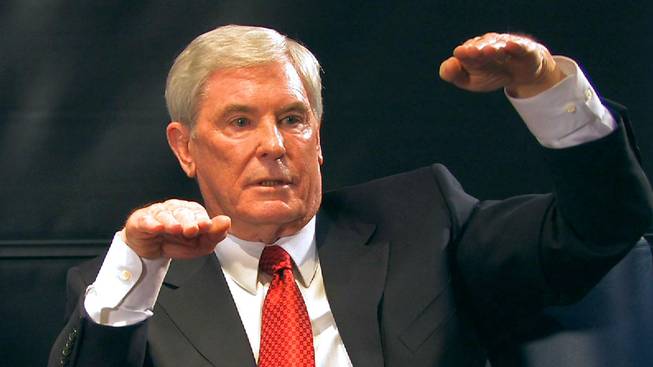
“If things turn around and just go back to normal, we are still terribly behind,” former Gov. Kenny Guinn says of upcoming state budget talks.
Thursday, Aug. 21, 2008 | 2 a.m.
Sun Topics
Beyond the Sun
State political leaders have spent the past year searching for ways to cut the budget. Because of the continuing economic downturn, they will likely be preoccupied with more of the same when the 2009 Legislature convenes in February.
Former Republican Gov. Kenny Guinn wonders who is looking to the future.
“What have we done besides talk about cuts for the last year?” Guinn said in a recent interview with the Sun. “You have to talk about them, but parallel to it, you have to have a program running over here with people looking, saying, ‘How long can we afford to do it this way?’ ”
There has been a lack of leadership, he said, on a long-term plan to both address the budget crisis and eventually rebuild the services that have been cut.
“The next biennium is going to be extremely difficult,” Guinn said. “What we need is a long-term strategy.”
Gov. Jim Gibbons formed the Spending and Government Efficiency (SAGE) Commission to examine ways to increase the efficiency of state government. That’s a start, Guinn said, but anyone looking at Nevada’s future should consider more than cuts.
Gibbons and legislators have hacked $1.2 billion from the current budget. They likely will need to cut more than $1 billion from the next budget, which they will debate during the upcoming legislative session.
“What’s going to be left for the SAGE Commission to tell us needs to be cut?” Guinn said.
“That might have been a good thing when someone decided we needed to do it. But look at it today, you would change focus, say, ‘Wait a minute, let’s use these high-powered people, use the resources they have collected, let’s really look at developing a strategy, a plan, to help us as we move forward with these issues of revenue versus expenditures.’
“We’re just on one side, of just cut. That’s not a plan. We’re being forced to cut, so that’s not a plan,” he said.
Guinn served eight years as governor before term limits ended his time as the state’s chief executive in 2006. He had been superintendent of the Clark County School District, head of a Las Vegas Valley savings and loan, interim president of UNLV and chief executive officer of Southwest Gas Corp.
Guinn insisted his remarks should not be interpreted as criticisms of Gibbons, with whom he has publicly sparred in the past.
The falling out between the two Republicans dates to a 2003 speech Gibbons, then a member of Congress, gave to the Nevada Legislature criticizing the proposed tax increase that Guinn supported.
Citing the 2003 budget standoff — it ended with the tax increase passing over the objections of some Republican lawmakers — Guinn said whoever has a plan for the state’s future will also have the high ground in the debate. He said he repeatedly asked for suggestions from opponents of his plan on what should be cut instead of passing the tax increase. He said he never received any.
“If you have a plan, the pressure is on them,” he said.
“If you’re a Republican and you have a plan, Democrats have a problem. If you’re a Democrat and have a plan, Republicans have a problem,” he said.
Despite the recent deep budget cuts, Gibbons has stood by his pledge not to raise taxes and continued to insist the state’s problem is excess spending. (“The problem is not taxes. The problem is spending ... We have a spending problem”).
The governor has asked department heads to come up with 14 percent cuts as he prepares his budget, which lawmakers will debate when the 2009 Legislature convenes in February. Cuts of that magnitude would be the deepest since the Great Depression.
Gibbons’ spokesman, Ben Kieckhefer, said the governor will also propose a spending cap that would help Nevada weather economic ups and downs. The details are still being worked out, but the cap would prevent the state from spending excess revenue during good times and set aside that money to use during downturns.
“The governor wants to have a steady and predictable amount of growth,” Kieckhefer said. “We have a system now where the state has allocated all the money it thinks it has every year.”
Democrats are scheduling a series of town hall meetings across the state and are expected to unveil their plan in September.
Legislative veterans expect the 2009 session will be the most contentious in recent memory.
Further budget cuts seem inevitable during the session, Guinn said, and with the economy sliding, now is not the time to raise taxes. But the state needs to look beyond its immediate problems, he said.
“If things turn around and just go back to normal, we are still terribly behind,” Guinn said.
“I think what reasonable people are starting to say is, ‘If this goes on for two years, and then another two years, when do we do something different from cutting?’ ”
This economy would severely challenge anyone in the Governor’s Mansion. Guinn said the budget crisis has gone on longer and been more pronounced than the sudden slump he faced as governor, after the 9/11 attacks.
Still, Guinn said, he sees a lack of state leadership in developing a plan for the future.
“The reason we have a CEO of a company, the president of the United States, the reason we have a governor, is, we put them in a leadership role,” he said. “Some people are better at it than others. But leadership is tantamount to the position.”
Sun Capital Bureau reporter Cy Ryan contributed to this report.

Join the Discussion:
Check this out for a full explanation of our conversion to the LiveFyre commenting system and instructions on how to sign up for an account.
Full comments policy